|
|
|
Sort Order |
|
|
|
Items / Page
|
|
|
|
|
|
|
| Srl | Item |
| 1 |
ID:
137736
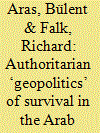

|
|
|
|
|
| Summary/Abstract |
The Arab Spring has shaken not only the state and society dimension in the countries of the MENA region but also the power of authoritarian leaders that had been ensured for a long period of time. This paper takes a critical look at the issue of how authoritarian regimes reacted to the new political atmosphere produced by the Arab Spring. More specifically it attempts to identify how geopolitical reasoning influenced the formulation of new strategies designed to promote the survival of authoritarian regimes. It focuses upon the geopolitical reasoning relied upon by Iran and Saudi Arabia, which included creating threat-enemy chains in domestic politics, shifting alliances in regional policy and taking advantage of relations with external actors to gain support for authoritarian rule at home
|
|
|
|
|
|
|
|
|
|
|
|
|
|
|
|
| 2 |
ID:
132973
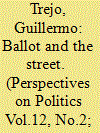

|
|
|
|
|
| Publication |
2014.
|
| Summary/Abstract |
This article presents a new explanation of the widespread occurrence of cycles of protest in electoral autocracies - the most common type of authoritarian regime in the world today. Because multiparty elections in autocracies are partially free but unfair, opposition parties are compelled to compete for office while contesting the rules of competition. To fulfill this dual goal, opposition parties actively seek to recruit a wide variety of independent social movements who can provide votes and lead major mobilizations during election campaigns and in post-election rallies to denounce fraud. Because electoral participation can cause divisions within social movements, social activists join socio-electoral coalitions when opposition parties offer them financial and logistic resources and institutional protection to mobilize for their causes during non-election times. This quid pro quo explains how isolated protest events become aggregated into powerful cycles of mobilization and why protest is more intense during elections but persists beyond election cycles. When political liberalization leads to increasingly free and fair elections, the prospect of victory motivates opposition parties to discourage radical mobilization, bringing cycles of protest to an end. Drawing on an original database of indigenous protest in Mexico and on case studies, I provide quantitative and qualitative evidence of the causal impact of electoral incentives on the rise, development and decline of a powerful cycle of indigenous protest as Mexico transitioned from one-party to multi-party autocracy and into democracy. Beyond Mexico, I show that the introduction of multiparty elections in a wide variety of autocracies around the world gave rise to major cycles of protest and discuss why the relationship between the ballot and the street is a crucial factor for understanding the dynamics of stability and change of authoritarian regimes.
|
|
|
|
|
|
|
|
|
|
|
|
|
|
|
|
| 3 |
ID:
138246


|
|
|
|
|
| Summary/Abstract |
The Battle of Gökdepe (1881) is considered to be a turning point in Turkmenistan’s contemporary historiography. It led to the then independent Turkmen (Akhal Tekke in this case) tribes coming under Russian control. Almost immediately after the event the battle became a controversial point of interpretation starting from Turkmen sources (rarely known to us), an immense number of Russian (mostly military) sources, up to the Soviet historians. The post-Soviet official Turkmen historiography of the event came from these foundations, but used its own mythological approach. As a result, the contemporary narrative of the Gökdepe defeat turned into a victory for the Akhal Tekke (and broadly Turkmen) nation. Additionally, this paper argues that the first and partly the second presidents of Turkmenistan incorporated the battle into their own personality cults, a fact which is still specific to the Central Asian context, albeit not unique in world history. In particular, the first president usurped the myth and connected it with his own historical narrative. The second president continues this in the frames of the already settled political culture in the country, adapting the Gökdepe myth to create his own ideological story. Therefore, the appropriation of the historical event in Turkmenistan represents a specific (albeit not unique) case of this kind and shows the way of thinking about the leader in current Turkmenistan.
|
|
|
|
|
|
|
|
|
|
|
|
|
|
|
|
| 4 |
ID:
121218
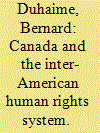

|
|
|
|
|
| Publication |
2012.
|
| Summary/Abstract |
When Canada became a Member of the Organization of American States
(OAS) in 1990, most of Latin America was at a crossroad in a post-cold
war transition from authoritarian regimes to democracies. The Canadian
government played a fundamental role in the creation and development of
the organization's unit for the promotion of democracy, as well as of other
similar initiatives, in this period. This mark of leadership would have an
important impact on the organization later on, including regarding the
adoption of the 2001 Inter-American Democratic Charter, which attests to the importance of human rights for democracy and vice-versa. In fact, the
promotion of democratic processes and the consolidation of democratic
institutions, as well as the promotion and protection of human rights, are
certainly among the OAS's most signi?cant successes in the institution's
recent history.1
|
|
|
|
|
|
|
|
|
|
|
|
|
|
|
|
| 5 |
ID:
132887
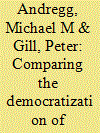

|
|
|
|
|
| Publication |
2014.
|
| Summary/Abstract |
This introductory article discusses some of the main themes that are contained within this collection originally delivered as papers to two conferences. There is brief consideration of some issues of method and major themes relating to the legacy of authoritarian regimes, the process of change and the current state of 'democracy' are identified. Continuing controversies and uncertainties around intelligence have important implications for democratic governance in many countries which must encourage more comparative work in this key area of intelligence studies.
|
|
|
|
|
|
|
|
|
|
|
|
|
|
|
|
| 6 |
ID:
142075
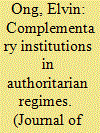

|
|
|
|
|
| Summary/Abstract |
Recent political science research has suggested that autocrats adopt a variety of institutions such as nominally democratic elections and ruling parties to buttress authoritarian durability. In this article I investigate the role of constituency service in an authoritarian regime. I argue that Singapore's Meet-the-People Sessions (MPS) is a complementary institution that can serve to mitigate the weaknesses of other authoritarian institutions, thereby entrenching authoritarianism, rather than serve as a form of democratic representation. First, it is a mechanism to gain valuable everyday information about grievances within the population, thereby allowing the ruling People's Action Party (PAP) to formulate policies and effectively target its response. Second, it is a convenient venue to recruit and socialize ordinary party members, thus helping the PAP forestall potential party decay. Symbolically, conducting MPS is a material performance of the hegemonic ideology of elitism between PAP politicians and ordinary Singaporeans.
|
|
|
|
|
|
|
|
|
|
|
|
|
|
|
|
| 7 |
ID:
149178
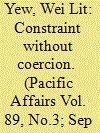

|
|
|
|
|
| Summary/Abstract |
How can we begin to understand “repression” when a soft authoritarian regime like Malaysia both tolerates yet simultaneously hinders environmental contention? I argue that addressing indirect repression in the form of state-imposed constraints is one such point of departure. Beneath the veneer of tolerance, repression still exists in subtler forms. Such unobserved constraints emerge mainly through non-coercive bureaucratic processes and procedures undertaken by state agents. Though aggregated effect may not defeat a movement, it nevertheless elevates the overall cost of collective action by circumscribing movement forms and options, and demobilizing resources and supporters. This perspective goes beyond the conventional issue_image_89_3_Environmental Protest Malaysia - EA photo1attention on coercion—the show and use of force—in non-democracies. Based primarily on activist accounts related to the Broga anti-incinerator campaign and the Kuantan protests against a rare earth plant in Malaysia, this article demonstrates how indirect repression, in the form of state-imposed constraints, is perceived, experienced, and responded to by activists. I point to four prominent ways in which the constraints indirectly undermine activists’ campaigns: ostentatious surveillance, judicial channelling, occupational repression, and administrative constraints. Intended or otherwise, constraints seem less costly than coercion and help absolve political rulers of direct culpability. Besides completing the picture of repressive patterns under authoritarianism in Malaysia, this article’s focus on constraints suggests that the authoritarian state is ambivalent about grassroots activism that does not challenge the political order.
|
|
|
|
|
|
|
|
|
|
|
|
|
|
|
|
| 8 |
ID:
146502
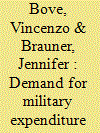

|
|
|
|
|
| Summary/Abstract |
This paper examines whether there are systematic differences in military spending between different types of autocratic regimes. We view military expenditure as an instrument a dictator can exploit in order to stay in power. How he utilises this instrument depends on the institutional set-up of his regime. We distinguish between military regimes, single party states and personalist regimes, and predict that military regimes should have the highest, whereas personalist dictatorships should have the lowest level of military spending. Using panel data on 64 dictatorships from 1960 to 2000, we find empirical evidence that our hypotheses are not rejected.
|
|
|
|
|
|
|
|
|
|
|
|
|
|
|
|
| 9 |
ID:
162084
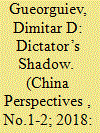

|
|
|
|
|
| Summary/Abstract |
President Xi Jinping is arguably the most powerful Chinese leader since Chairman Mao. Recent constitutional revisions and a midterm leadership reshuffle has only substantiated the fear that Xi, like Mao, has no intention of handing over power to a future successor. Does Xi’s rise signal an end to collective leadership and does a stronger president translate into a weaker party? In this article, I review the methods by which Xi has come to consolidate power as well as the implications for Chinese elite politics in the future. Drawing insights from the comparative literature, I question the zero-sum relationship between executive and institutional strength. Although Xi has certainly amassed unprecedented personal power, it has not necessarily come at the expense of the Party. Instead, the dangers of Xi Jinping’s power grab are more likely to result from a chilling effect on dissenting opinions and thinning out of the leadership pipeline, each of which is likely to undermine governing capacity over the medium to long-term.
|
|
|
|
|
|
|
|
|
|
|
|
|
|
|
|
| 10 |
ID:
086255
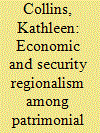

|
|
|
|
|
| Publication |
2009.
|
| Summary/Abstract |
The 'new regionalism' has spread to Central Asia; yet there has been little success in implementing most regional initiatives there. Security regionalism has had greater success than economic regionalism, even though economic initiatives would bring great benefits to the economy and population. I propose a connection between patrimonialism and regionalism. Central Asia's patrimonial leaders are driven by survival and personal enrichment, and are beholden to informal vested interests. Since economic regionalism involves liberalisation that adversely affects these actors, the result is 'virtual' economic regionalism at best. In the case of security regionalism, some regional organisations progress because they bolster patrimonial regimes, with negative consequences for democracy.
|
|
|
|
|
|
|
|
|
|
|
|
|
|
|
|
| 11 |
ID:
145076
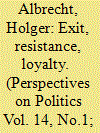

|
|
|
|
|
| Summary/Abstract |
A few years into the most recent wave of popular uprisings—the Arab Spring—studying regime trajectories in countries such as Syria, Egypt, and Yemen still seems like shooting at a moving target. Yet what has not escaped notice is the central role military actors have played during these uprisings. We describe how soldiers have three options when ordered to suppress mass unrest. They may exit the regime by remaining in the barracks or going into exile, resist by fighting for the challenger or initiating a coup d’état, or remain loyal and use force to defend the regime. We argue that existing accounts of civil-military relations are ill equipped to explain the diverse patterns in exit, resistance, and loyalty during unrest because they often ignore the effects of military hierarchy. Disaggregating the military and parsing the interests and constraints of different agents in that apparatus is crucial for explaining military cohesion during such crises. Drawing on extensive fieldwork we apply our principal-agent framework to explain varying degrees and types of military cohesion in three Arab Spring cases: Bahrain, Yemen, and Syria. Studying military hierarchy elucidates decision-making within authoritarian regimes amid mass mobilization and allows us to better explain regime re-stabilization, civil war onset, or swift regime change in the wake of domestic unrest.
|
|
|
|
|
|
|
|
|
|
|
|
|
|
|
|
| 12 |
ID:
133816
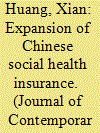

|
|
|
|
|
| Publication |
2014.
|
| Summary/Abstract |
This article asks 'who gets what, when and how' from China's recent social welfare expansion. Little research to date examines the overall landscape of China's social health insurance, which has changed dramatically since 2003, and the distributive consequences and implications thereof. Drawing on public survey data and fieldwork for empirical support, this article finds that China's recent social health insurance expansion does significantly expand people's access to social health insurance. However, the expansion, which entails health insurance fragmentation and increasing benefit disparities, not only reinforces existing social cleavages such as the rural-urban divide, but it also generates new divisions within urbanites and workforce. Moreover, multiple social cleavages that cross-cut class differences have been institutionalized into China's social health insurance system. This reflects authoritarian regimes' 'divide and rule' tactic in social welfare provision.
|
|
|
|
|
|
|
|
|
|
|
|
|
|
|
|
| 13 |
ID:
145827
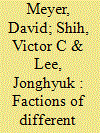

|
|
|
|
|
| Summary/Abstract |
The literature on faction suggests that patrons in the party may recruit faction members on the basis of a broad range of shared traits and experience. Some scholars argue reasonably that with increasing specialization of officials, factions are increasingly dominated by those with shared work experience in a set of bureaucracies. Although this trend may be true in general, senior leaders may still recruit those with whom they share birth place and school ties into their factions. To investigate this, we first derive four reasonable ways of measuring factional ties as suggested by the literature. We then explore the factional recruitment strategy pursued by each reform-era (1978–present) party secretary generals of the CCP by evaluating the measures of factional ties which predicted their clients’ promotions to full Central Committee membership. Our results show that Hu Yaobang, Jiang Zemin, and Xi Jinping pursued broadly based factional recruitment strategies, while Hu Jintao recruited faction members mainly from work colleagues. We further uncover signs that the party institutions may allow deposed secretary generals some measure of influence over promotions even after their political demise. At the same time, strict retirement rules on lower level officials gave rise to a cohort effect that gave the general secretary greater influence over the promotion of alternate Central Committee members to the full Central Committee during their first term than in subsequent terms.
|
|
|
|
|
|
|
|
|
|
|
|
|
|
|
|
| 14 |
ID:
133713
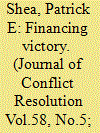

|
|
|
|
|
| Publication |
2014.
|
| Summary/Abstract |
With access to inexpensive credit, states can finance wars without overburdening their constituents, and face relatively small short-term costs compared to states with poor credit access. As a result of these economic benefits, states with lower credit costs will be more likely to win their wars, ceteris paribus. However, lower borrowing costs provide states domestic political benefits, which I argue are more important for democracies than nondemocracies. Since expensive credit forces states to rely on its citizens for revenue, governments that are more sensitive to their citizens' preferences are at a disadvantage. In sum, I argue that democracies are more sensitive to credit costs than authoritarian regimes. To test this theory, this article analyzes a data set of wars using logistic regressions and matching techniques, and examines the case of the Chaco War. The results demonstrate that the costs of borrowing have a substantial effect on war outcomes, and that these costs are more important for democracies than nondemocracies.
|
|
|
|
|
|
|
|
|
|
|
|
|
|
|
|
| 15 |
ID:
186565
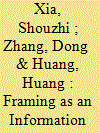

|
|
|
|
|
| Summary/Abstract |
How can authoritarian regimes effectively control information to maintain regime legitimacy in times of crisis? We argue that media framing constitutes a subtle and sophisticated information control strategy in authoritarian regimes and plays a critical role in steering public opinion and cultivating an image of competent government during a tremendous crisis. Using structural topic models (STM), we conduct a textual analysis of more than 4,600 news reports produced by seven Chinese media outlets during the COVID-19 pandemic. We find that Chinese media, instructed by the propaganda authorities, used a heroism frame to feature frontline medics’ sacrifices when saving others in need and resorted to a contrast frame to highlight the poor performance of the United States in the fight against COVID-19. We also show that both state and commercial media outlets used these two frames, though the tone of commercial media coverage was generally more moderate than the state media version.
|
|
|
|
|
|
|
|
|
|
|
|
|
|
|
|
| 16 |
ID:
108356
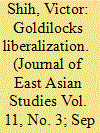

|
|
|
|
|
| Publication |
2011.
|
| Summary/Abstract |
Nearly two decades after central bankers began to call for interest rate liberalization, the central bank continues to impose stringent rules on the fluctuation of deposit interest rates. This seems an unlikely outcome given widespread endorsement of liberalization by technocrats and experts both in and out of the government, China's accession to the World Trade Organization, and the technocrats' insulation from popular pressure. To be sure, local interests and central bank lobbying have driven gradual liberalization of interest rates. However, senior Chinese technocrats held on to control over interest rates because of their need to maintain state banks' dominance and to mobilize bank funds in times of economic downturns. As such, progress toward interest rate liberalization only to ok place during "Goldilocks" phases when the economy enjoyed healthy growth without high inflation.
|
|
|
|
|
|
|
|
|
|
|
|
|
|
|
|
| 17 |
ID:
133731
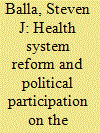

|
|
|
|
|
| Publication |
2014.
|
| Summary/Abstract |
Authoritarian regimes, such as the Chinese Communist Party (CCP), seek to bolster legitimacy by facilitating communications between citizens and government officials. This article investigates the operation of online consultation, a process through which citizens offer feedback on draft laws and regulations. The article specifically examines the importance of demographic characteristics and subjective motivations in the expression of citizen sentiments in response to a proposed revision to China's health system. By bringing together analysis of the content of citizen sentiment with a survey of participants, the article illuminates the determinants of the tone and substance of citizen feedback in health system reform. The primary finding is that participants who were internally efficacious and democratically oriented were, relative to respondents not possessing such traits, positive in tone and highly substantive in the submission of their comments concerning health system reform. This finding indicates that the health system reform commenting process offered citizens the opportunity to gain exposure to democratic principles and the process of articulating interests. More broadly, the analysis suggests the promise of online consultation in promoting citizen satisfaction with public policies, the legitimacy of the CCP, and, ultimately, stability in the Chinese political system.
|
|
|
|
|
|
|
|
|
|
|
|
|
|
|
|
| 18 |
ID:
119242
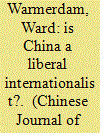

|
|
|
|
|
| Publication |
2012.
|
| Summary/Abstract |
China has been accused of many things with respect to its engagement with the developing world, especially with Africa. They include being driven by thirst for oil and natural resources,1 neglecting human rights offences in recipient nations,2 supporting, directly or indirectly, corrupt authoritarian regimes and dictators,3 and undermining Western efforts in these countries to promote good governance,4 maintain debt sustainability5 and improve governance and social welfare.6 China, on the other hand, argues that its engagement with the developing world is one based on mutual benefit7 and a respect for national sovereignty,8 which both China and its partners regard as an alternative to dominant Western models of development for developing nations.
|
|
|
|
|
|
|
|
|
|
|
|
|
|
|
|
| 19 |
ID:
133733
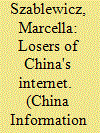

|
|
|
|
|
| Publication |
2014.
|
| Summary/Abstract |
Diaosi (??) ranked as one of the most popular Internet memes of 2012, and it continues to be popular to this day. This article analyses the origins and nature of the diaosi meme and the young men (and women) who self-mockingly describe themselves as 'losers'. The meme has led to ample speculation in the media and among Chinese academics, and while some see the meme as a relevant form of political critique, others dismiss it as indicative of a psychological malaise affecting contemporary youth. This article reviews the state of this debate about the meanings of the diaosi phenomenon, while offering a new interpretation that frames the meme in terms of Raymond Williams's notion of 'structures of feeling'. Though diaosi is a seemingly humorous and playful Internet meme, it is also one that signals young netizens' disillusionment with the apparent lack of possibilities for upward socio-economic mobility in contemporary China. This author contends that the diaosi phenomenon, though amorphous and at times contradictory, may also be considered an emergent form of affective identification through which alternative desires and forms of mobility may be imagined and enacted.
|
|
|
|
|
|
|
|
|
|
|
|
|
|
|
|
| 20 |
ID:
160570
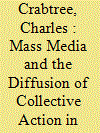

|
|
|
|
|
| Summary/Abstract |
A growing literature attributes the rapid diffusion of domestic collective mobilization against authoritarian regimes to foreign mass media broadcasts. We examine this relationship in the context of the June 17, 1953, uprising in East Germany, the first national rebellion against communist rule in Eastern Europe. The uprising involved an extraordinarily swift and wide-ranging diffusion of antiregime collective action. Observers on both sides of the Iron Curtain attributed the revolt to Western media broadcasts, particularly news broadcasts by the Radio in the American Sector (RIAS) of Berlin. While historians have strongly endorsed this view, social scientists have never quantitatively tested it. We investigate the potential relationship between municipality-level protest events and RIAS broadcasts by exploiting plausibly exogenous variation in RIAS signal strength across East Germany. We find no evidence to support the hypothesis that RIAS caused the diffusion of protest during the uprising. Instead, our results suggest that social ties likely played an important, and underrecognized, role in the swift diffusion of antiregime collective action.
|
|
|
|
|
|
|
|
|
|
|
|
|
|
|
|
|
|
|
|
|